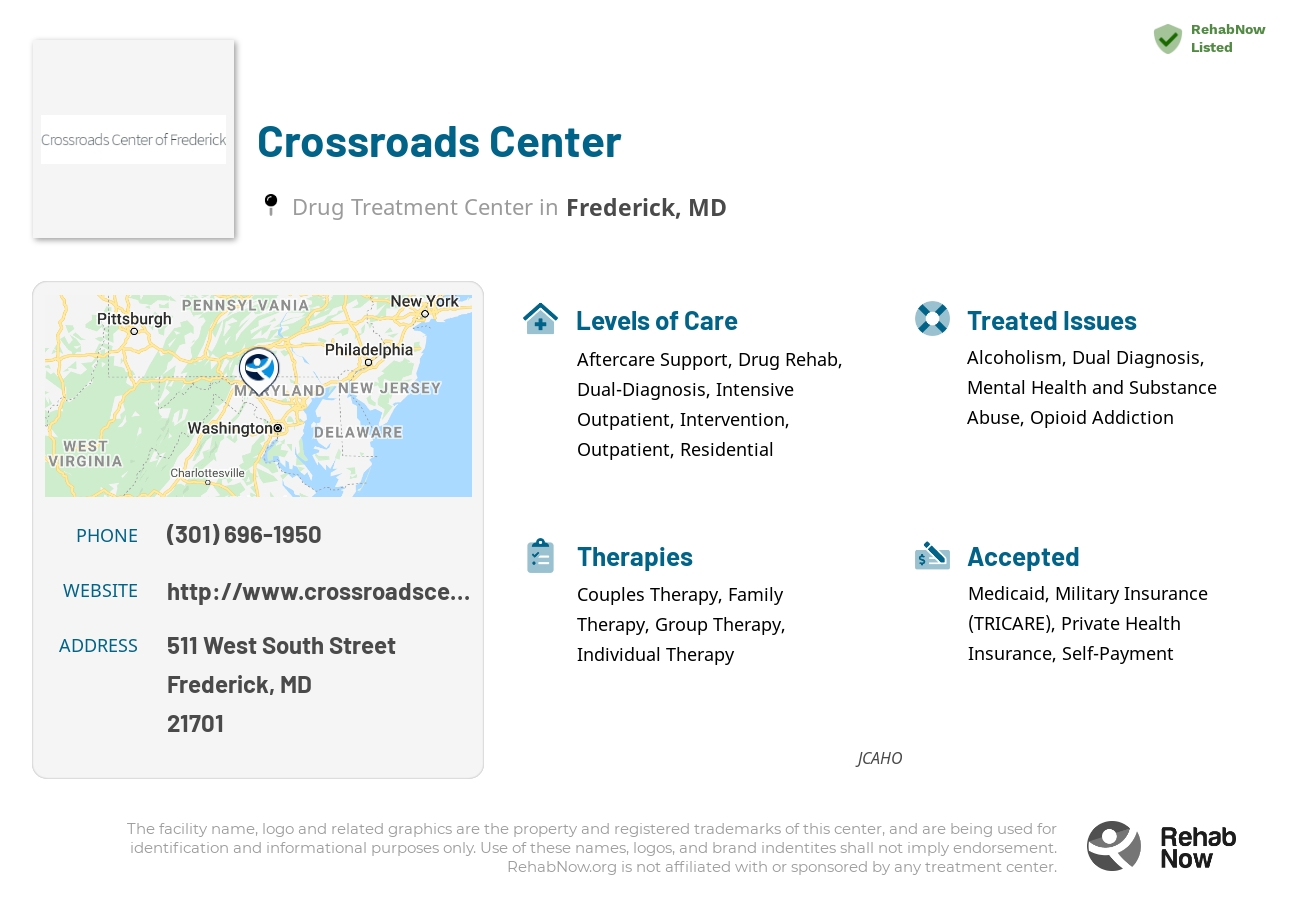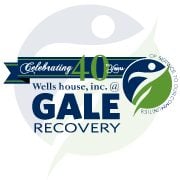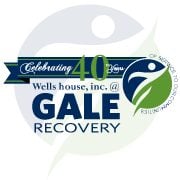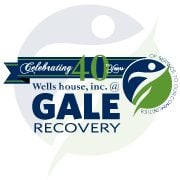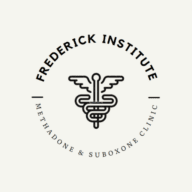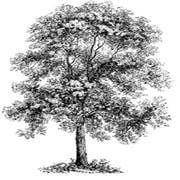Crossroads Center
Drug Rehab Center in Frederick, Maryland
Crossroads Center is a highly-regarded addiction treatment facility located in Frederick, Maryland that offers comprehensive programs, modern therapies and cutting edge treatments, is fully accredited by the Joint Commission on Accreditation of Healthcare Organizations, and accepts a variety of private health insurance plans.
About
Crossroads Center in Frederick, Maryland, exists as a beacon of hope for individuals struggling with alcohol and drug addiction. With a dedicated staff and a focus on personalized care, Crossroads Center stands out for its commitment to helping people achieve sobriety through diverse and modern treatment programs.
Holding an accreditation from the Joint Commission on Accreditation of Healthcare Organizations (JCAHO), Crossroads Center epitomizes a high standard of care in the addiction treatment community. The center's comprehensive approach is designed to meet the unique needs of each person, offering a pathway to recovery that encompasses both mental health and substance abuse.
- Accredited by JCAHO, ensuring clients receive care that meets rigorous healthcare quality standards.
- Offers a variety of treatment modalities, including 12-Step facilitation, Cognitive Behavioral Therapy (CBT), and Dialectical Behavioral Therapy (DBT).
- Accepts a range of private health insurance plans, making treatment accessible to those in need.
Specializing in the treatment of alcohol and drug addiction, Crossroads Center provides tailored programs that may include intensive outpatient, dual-diagnosis programs, and residential long-term care. They utilize evidence-based therapies such as CBT and DBT to support recovery and promote wellness.
Genders
Ages
Modality
Additional
Accreditations

JCAHO
Conditions and Issues Treated
Within the past decade, opioid addiction has become a nationwide epidemic. The United States hosts one of the world’s highest rates of opioid use or abuse and has one of the highest rates of opioid-related deaths. In the United States, opioid drugs are classified as Schedule II-IV controlled substances due to their highly addictive properties and potential for abuse. These include morphine, opium, heroin, oxycodone, hydrocodone, methadone, and fentanyl. Physicians usually prescribe opioids to help control pain.
Over time, opioid users develop a tolerance for the drugs, which makes it difficult, if not impossible, to function without them. In turn, opioid users often resort to illicit means of obtaining the drugs. These means can include drug dealers, friends, and family members who do not have legitimate prescriptions for the drugs. Opioid addiction can quickly lead to heroin use, especially those seeking more intense highs than prescription opioids offer. Due to the high risk of overdose, heroin users are at a much higher risk for illness and death.
A person who struggles with addiction and a mental health condition suffers from a dual diagnosis. This means that they have two issues that must be treated. The specific mental health issues that the patient at Crossroads Center might have include but are not limited to:
- Depression
- Bipolar Disorder
- Anxiety
- PTSD (Post Traumatic Stress Disorder)
The specific addiction issues that the patient might have include but are not limited to:
- Alcoholism
- Drug Addiction (i.e., Cocaine, Meth, and other stimulants, Marijuana, and Ecstasy)
The combination of the two illnesses can be tough to treat. Taking care of one or the other is tough, and taking care of both cannot be done alone. A patient who receives dual diagnosis treatment will be given the best chance at becoming sober.
Levels of Care Offered
This center offers a variety of custom treatment tailored to individual recovery. Currently available are Aftercare Support, Drug Rehab, Dual-Diagnosis, Intensive Outpatient, Intervention, Outpatient, Residential, with additional therapies available as listed below.
Intensive Outpatient Programs are similar to partial hospitalization, but they don’t require the patient to go home each night.
This means that while they have to attend meetings and receive other types of help at the facility, addicts are allowed to keep their jobs or continue with school without having to miss their classes or work opportunities. This is a great option for those who can’t take time away from their jobs or schedules to attend a treatment program.
During this type of program, the addict will be required to meet with counselors and other types of professionals throughout the day. This will help them stay on track and prevent them from relapsing after they leave the facility.
An outpatient treatment program is set up to help with alcohol or drug addiction or a co-occurring disorder. The treatment must attend the treatment facility for their therapy and other programs but return home each night. The frequency of mandatory attendance decreases after much of the treatment program is complete. The treatment programs are monitored by the treatment facility and case managers who work for a judge or judge’s office. A treatment program may be performed out of a treatment facility, treatment clinic, or treatment center.
The benefits of outpatient treatment programs are many. One of the most beneficial treatment programs is that it allows treatment for clients who cannot afford or may not be able to attend treatment at a treatment facility, treatment center, or treatment clinic full-time. Another benefit of treatment programs is that they reduce crime rates because treatment allows people to treat their addiction.
Residential treatment programs are those that offer housing and meals in addition to substance abuse treatment. Rehab facilities that offer residential treatment allow patients to focus solely on recovery, in an environment totally separate from their lives. Some rehab centers specialize in short-term residential treatment (a few days to a week or two), while others solely provide treatment on a long-term basis (several weeks to months). Some offer both, and tailor treatment to the patient’s individual requirements.
There are many different kinds of services that support and help people in recovery. Interventions help families and friends share feelings, express their desire for change, and plan for concrete steps toward recovery. Interventionists are trained professionals who assist family members in arranging an intervention or lead an intervention themselves. The family members should be involved in selecting an experienced professional to lead their loved one into treatment. Intervention services are available throughout the country.
Recovering drug addicts need aftercare support when they leave treatment. The support can include guidance through 12-step programs, outpatient rehabilitation programs, and support groups. Aftercare supports the individual in their desire to maintain sobriety by reducing relapse risk with positive choices.
The success of drug treatment does not end when the addict leaves the rehabilitation center. There is no such thing as a “one and done” type of rehabilitation process. Recovery is a lifelong journey that begins with treatment and continues by the addict committing to outside support groups or drug rehab programs.
When choosing a program, it is crucial to choose one that will provide long-term aftercare support. This ensures that you have the tools you need to sustain your recovery.
Therapies & Programs
Individualized Treatment is essential because it gives addicts the ability to participate in a program that meets their unique needs. An addict should work with professionals who understand what they’re going through, especially if the addict is actively using. Finding the right treatment program for an addict is difficult, but it’s even harder without communicating with those who have experience treating your specific situation.
Couples therapy is a treatment approach where the patients and their partners are engaged together. When a person becomes a victim of substance abuse, it affects the patient and his people, particularly his partner. Their relationship can become strained due to lack of communication, financial issues, loss of trust, lack of intimacy, and physical abuse in more severe cases. Couples therapy addresses these issues and tries to rebuild the trust between the partners. The partner’s involvement in the process will result in greater chances of treatment success and sustained recovery.
The therapies typically involve all family members, potentially including siblings, children, and parents who play a role in their daily lives. These sessions can be essential because they address past issues that may have affected an addict or alcoholic’s recovery process. They provide support during this time when it is needed most!
A family therapy session, often called a family meeting or intervention, is a necessary process that helps loved ones of addicts see their situation in a new light. It’s also one of the most challenging things families will ever have to do when they’re facing a loved one battling addiction or alcoholism.
Group therapy sessions provide recovering addicts with a chance to cope with everyday situations that many face. Group therapy sessions are held in rehab facilities, clinics, churches or community centers that offer drug addiction treatment.
People who attend these groups are encouraged to voice their feelings and support other addicts in recovery. This helps group members strengthen their own recovery program while cheering on others who are struggling with sobriety.
Payment Options Accepted
For specific insurance or payment methods please contact us.
Is your insurance accepted?
Ask an expert, call (888) 674-0062
Additional Details
Specifics, location, and helpful extra information.
Frederick, Maryland 21701 Phone Number(301) 696-1950 Meta DetailsUpdated April 15, 2024
Staff Verified
Patient Reviews
There are no reviews yet. Be the first one to write one.
Frederick, Maryland Addiction Information
For the past decade, Maryland's rate of drug use and abuse has significantly increased. The overdose rate is currently higher than the national average. This epidemic is due to the many industries where manual labor is required. As soon as prescription opioids were more readily accessible a large part of manual workers started using–and eventually abusing–the painkillers.
In 2012, 76 drug-related deaths were reported in Frederick County, Maryland. That's 9.1 deaths per 100,000 population, significantly higher than the state rate of 6.8 deaths for the same area. The cost of substance abuse in the Frederick, MD, area is estimated at $1.6 billion a year. There are several different types of drug treatment available in Frederick, MD such as inpatient rehab and outpatient rehab, etc.
Treatment in Nearby Cities
- Oxon Hill, MD (48.1 mi.)
- Federalsburg, MD (101.6 mi.)
- Bladensburg, MD (41.9 mi.)
- Salisbury, MD (122.2 mi.)
- Dundalk, MD (49.6 mi.)
Centers near Crossroads Center
The facility name, logo and brand are the property and registered trademarks of Crossroads Center, and are being used for identification and informational purposes only. Use of these names, logos and brands shall not imply endorsement. RehabNow.org is not affiliated with or sponsored by Crossroads Center.



